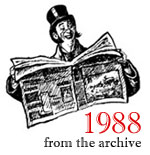
A Time to Fold the Wings of Intellect & Bow Before the Mysterious
BOTH TRADITIONAL & CHARISMATIC
Somehow it seems appropriate that someone with the very English name of Dimock from the very New England village of Stonington in Connecticut should write for the NEW OXFORD REVIEW, but it might seem odd that the subject is the charismatic renewal, which seems so foreign to the staid New England Catholic background that was my own. Actually the thesis of this article is that the best elements of the charismatic renewal are deeply traditional, and that it was these which first attracted me, have formed my spiritual and theological outlook, and continue to influence my thinking even now — but to see how I can make such a statement, let me sketch something of my personal and intellectual background.
I was raised in Connecticut, where my English forebears lived for over 300 years. This English and basically Puritan blood (although we have a record of a recusant Dimock dying in an English prison for having his son educated by a Catholic priest) was softened by my convert grandfather marrying into a Portuguese and Irish family on my father’s side, and my convert grandmother marrying into a French Canadian family on my mother’s side. On both sides the English and Puritan blood was Latinized: mellowed and enlivened by the Portuguese and French, but our Catholicism was that given us by the mainly Irish New England clergy — no nonsense, the truths of the Faith, clear moral teaching, sacramental practice augmented by well-attended devotions. This foundation has always stood me in good stead, but did not always do justice to the rich liturgical, mystical, and intellectual heritage of Catholicism. Yet the basics of Mass, the sacraments, the Commandments, the family Rosary, and the changing liturgical seasons and feasts were very much part of my boyhood and adolescence.
Midway through high school I made the acquaintance of a retired army colonel and his wife, and, as they took me under their cultural wing, I discovered what for me was a new world, the Catholic Literary Revival — Msgr. Knox, Waugh, Greene, and others. My Catholic world was further widened at Providence College in Rhode Island when I began studies at the collegiate level, drawn there by my desire to become a Dominican priest. The friar-professors, by exposing me to some Thomistic theology and medieval history, gave me a great sense of belonging. All this rich history and theology was my heritage as a Catholic — an important breakthrough for someone growing up in a small New England village where everyone is very conscious of history (most of which is not Catholic) and Catholics are made to feel like “Johnny-come-latelies.”
When I entered the Dominican Order, my intellectual formation was three years of classical Thomistic philosophy and four years of Thomistic theology in which the Summa of St. Thomas was our main text. Just before I was ordained, Vatican Council II was beginning to affect clerical formation and theological education. I was in favor of the liturgical reforms and experimentation which were reported on by the magazine Jubilee. This now defunct review sold icons, advertised records of Gregorian chant, told us of Taize, ecumenism, The Catholic Worker, Madonna House, vernacular in the Mass, and many of the movements that paved the way for Vatican II and were the subject of conversation of would-be intellectual Catholics just before the Council. With so much excitement, I’d begun to think my Thomistic formation was somewhat stodgy, but I’ve since come to realize how valuable it was and is as a unified framework, a system grounded in truth — natural, evangelical, and Catholic — yet open to legitimate new developments. It did not take me long to become a bit of a “peasant of the Garonne” — to see that many of the reforms that Vatican II enacted, and that I supported, were often being misinterpreted, their intent of aggiornamento secularized and the profound documents of the Council “popularized” beyond recognition. It was at this time, ordained for a year, that I went to the University of Notre Dame to study liturgy in the summer school; there I first came into contact with the charismatic renewal.
You May Also Enjoy
Pope Gregory’s program was really quite simple: To return to the people of Rome a sense of sin and a sense of the sacred.
Hymnal and missal editors aren’t infallible or unswervingly orthodox, and just because a song is in a hymnal or missal doesn’t mean it is free from error.
I have preached parish missions and retreats around the U.S. and Canada since 1975. It…

